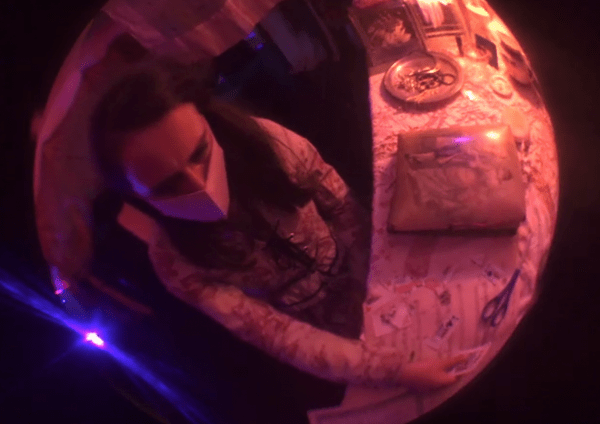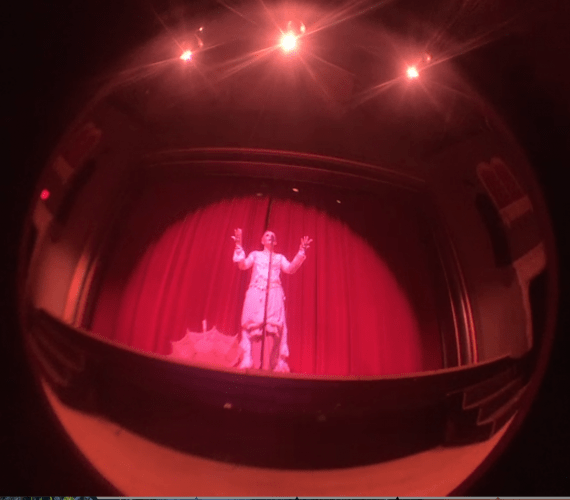Theater Feature: Eggtooth Productions’ “Stagehand” — Game-Theater Takes CyberStage
By Richie Davis
What will the response be to this innovative marriage of Zoom theater and video gaming? Some viewers will welcome the mash-up, others will not.

Maia Kinney Petrucha in a screen shot from Stagehand. Photo: Eggtooth Productions.
John Bechtold’s creativity ran far and wild when he was growing up outside Ithaca, NY. He created seemingly massive play spaces with his three brothers in fields and surrounding woods far from neighbors and friends.
“It was a great place for a long childhood and a fertile imagination to be given a lot of space,” recalls Bechtold, who’s taught and directed theater — now remotely — at Amherst Regional High School in Massachusetts since 1999.
And Bechtold is still finding ways to explore his theatrical imagination, even during this pandemic, when performance spaces everywhere have gone dark.
Together with Linda McInerney of Greenfield-based Eggtooth Productions, Bechtold has created Stagehand, a live, interactive stage production that combines (via Zoom) two digital experiences: participatory, immersive theater and video game. Viewers will see the action of the play through the eyes of their avatar, Charlie, the member of a stage crew who is trying to run through some of the ghost scenes in a production of Shakespeare’s Hamlet.
Eggtooth’s Stagehand is being presented live from the 850-seat Academy of Music in Northampton and the 350-seat Shea Theatre in Turners Falls February 18-20 and 25-27, at 7 and 9 p.m. Tickets are being sold primarily as six-person pods to encourage interplay among audience members as well as with the performers.
In this theater/video-game mash-up, explains Bechtold, Zoom screens become “a sort of window, a gateway or portal into something you wouldn’t have the privilege to see. In this case, it’s the world of Charlie and the actors he’s working with.” Viewers are invited, through the writer-director’s tight unscripted structure of key lines and plot arcs, to participate, to change things up.
Each pod is assigned its own Charlie to interact with, as well as its team of actors roaming the theaters. There’s also a technical director for each pod who will closely monitor the quality of the experience, modulating everything from the music, videos, and props to the actions of the costumed actors, who, through Charlie, may take their directions from audience members.
Eggtooth’s eight-performance October production of Stagehand gave Bechtold and McInerney a chance to work out bugs, including the challenge the unusual setup poses for actors performing (and in some cases obeying) the commands of a remote audience.
“We figured it out,” Bechtold insists. “Actors are trained in creating imaginary scenarios and environments, and in some ways that’s not too far from this. We’re finding there’s something that reaches across that divide that still fuels our actors.”
One reason Bechtold chose to go in this direction is that, for him, the recorded performances production companies have experimented with during the pandemic have, more often than not, come off as inert. They lack a sense of what’s essential in theater — a live, reciprocal connection. Bechtold argues that “one of the real pieces of magic in all theater is feeling a live interaction between you and the performance. There has to be something live about it.”
Drawn to that magic while earning his master’s degree in Theater from Harvard University in 2009, Bechtold welcomed the appearance of Punchdrunk, a London-based company whose immersive productions he’d been reading about, when the troupe came to Cambridge’s American Repertory Theater. At the time, Punchdrunk was creating, for the A.R.T., its production Sleep No More, which was going to be restaged in New York. Bechtold offered to volunteer and recalls that “it felt like I was coming home to people who speak the same language as me, and that was incredible.” He stayed with Punchdrunk: “I stuck around; the weeks turned into months and the months into a couple of years, as they went from their Boston production to New York,” where the “merry macabre chase” based on Macbeth, as the New York Times has called it, was still running until put on hiatus by COVID.
“We spent a lot of time together, and I think they really became my chief mentors in this work,” says Bechtold, who began incorporating immersive theater techniques at Amherst beginning in 2010 with an adaptation of Maurice Sendak’s Outside Over There, staged at Double Edge Theater in Ashfield.
A 2017 sabbatical gave Bechtold the opportunity to research immersive theater practices with a variety of production companies around the United Kingdom.
“Immersive theater is about nontraditional spaces,” says Bechtold. In Stagehand, he challenged himself with having to tangle (and untangle) two different kinds of digital interaction — the competitive energy of video games with the more meditative experience of viewers wandering through playhouses in cyberspace. What brings the odd couple together? “It’s about establishing a world that you’ve been invited into and can play in, even as a theatrical narrative is unfolding.”
With McInerney, whom he met while she was staging Old Deerfield Productions summer theater and he was directing Deerfield Academy Summer Arts Camp, Bechtold started creating, in 2011, interactive, site-specific theater for Eggtooth’s Double Take Fringe Festival in Greenfield.

Emily Pritchard on stage in a red bubble. A screen shot from Stagehand. Photo: Eggtooth Productions.
Five years later they mounted an immersive version of Shakepeare’s The Winter’s Tale using spaces on five floors in a downtown Greenfield building. They followed that in 2018 with Deus Ex Machina, which let the audience explore dressing rooms and pits around the Shea, a vaudeville theater, built in the ’20s, that the Renaissance Commune turned into a psychedelic happening hall in the ’70s.
Bechtold and McInerney created Stagehand as the response to the Academy of Music and Shea closing their doors. “These spaces are so close to our hearts,” McInerney explains. “Being (together for Stagehand ) is huge. Being in the buildings again is huge; I didn’t expect myself to have such a strong visceral response to stepping back into them.”
One of the lessons from the October production, McInerney says, was coming up with ticketing that set up five pods each performance so that six people could share seeing Stagehand together. A sixth, “wildcard” pod for each performance allows for individual tickets grouped at random.
One obstacle was getting people past the hurdle of having to take in another Zoom session. Even McInerney had to fight off her reluctance. “I thought I’d have to get over my Zoom rage to be OK with it,” she acknowledges. “But the minute you’re in there and engaged and it all melts away, and you’ve just poured yourself through this portal, the word ‘Zoom’ will never enter your mind again.”
As for the marriage of Zoom theater and video games, some will welcome the mash-up, others will not. “Anybody younger than 40 or 45 gets it,” McInerney says, “Once you’re in there in the Zoom room talking to Charlie, the language of what it is, is completely immaterial. It’s just your own imagination going.”
Bechtold remembers the six disgruntled audience members who he’d see walk out of each early performance of Sleep No More. He expects that this distinctive cyber-show will test audience limits. But the risk is worth it if theater is going to thrive, now and after COVID: “We feel we have a way to make work and share it with our communities, to celebrate these particular spaces. And we also think we have found a way to make Zoom weird again.”
Richie Davis is retired senior writer at the Recorder in Greenfield, MA, where he reported and edited for over 40 years. His writing has also appeared in the Daily Hampshire Gazette in Northampton, and he was arts and weekend editor at the Springfield Daily News and an editor at Genesee Valley Newspapers in suburban Rochester, NY. He has also performed around the country as a drummer specializing in klezmer, Greek, and Sephardic music. The author of Inner Landscapes: True Tales from Extraordinary Lives, he blogs at richiedavis.net

As for a reply, John was born to “into the theater experience,” as all present, when entered this world, burst into laughter, enjoying this very active baby. It was almost an incident with a hat and cane, immersed in a very large and wonderful imagination. Which turned out to be true. All four brothers were close in age, and the four imaginations, left nothing unexplored and experienced. However, his love of theater exploded, when he was in his first theater experience on the high school stage, in a very small, very rural school. It was his good fortune, there was a great little theater in a local village, from very early in 1900. In his last summer at home, and in the Aurora theater, he lead a group of local children through a summer of fun, and theater, in that lovely old building. Then, he enjoyed various productions in College, which allowed my first immersive experience. And after his start as an English teacher, and theater experience, he showed what that little baby could and would do with theater and kids, and adults. Not to mention what COVID-19 encouraged. Never ever use the word “impossible,” in his presence, because there is no such thing!